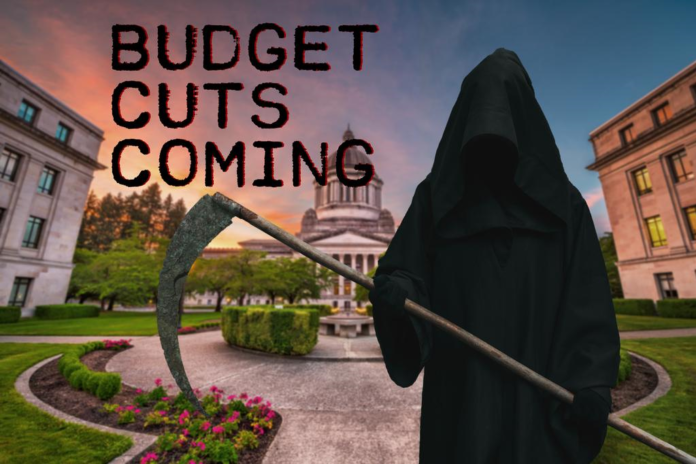
TO RECEIVE THE LATEST NEWS FROM WE THE GOVERNED DELIVERED STRAIGHT TO YOUR INBOX –SUBSCRIBE HERE
Support We the Governed – MAKE A DONATION HERE

Government has continued expansive growth far disproportionate to population growth over the past few decades. This bloat has become a tax-burden. In good times, the taxpayers can carry the burden. However, we are in a critical economic crisis (which is going to long outlast the temporary health crisis of the Wuhan/Corona Virus). It will be critical for hard decisions to be made quickly in order to mitigate the impacts of this financial decline. Here are some suggestions where we can start.
State and local focus
The Federal Government bureaucracy needs downsizing. However, we focus on local government issues because it is easier to change state government than to impact the bloated behemoth of DC. Local and state government can’t print their own money or run trillion dollar deficits. We live in Washington State, so let us start here. For those who live in other states, this is a good exercise which anyone can use to apply to your local and state government as well.

Nobody can predict the future with total certainty, but some obvious results are coming down the road. The first is a very dramatic decrease in tax revenue to local government, directly as a result of economic decline. Local governments have been quick to impose emergency measures and implement quarantine rules over the Corona Virus, but they will be less eager to adjust to the decline in tax revenue. Reality will force them to make tough and serious decisions. Historically we have elected very few serious people in these positions. This is unfortunate. However, the quicker we make these decisions, the less harmful the final and long-term costs will be in our communities, and the sooner our communities can come out of the economic decline. If we delay, the impacts in our community will only be worse, and the elected officials who refuse to make these choices must be replaced.

Tax revenue will collapse
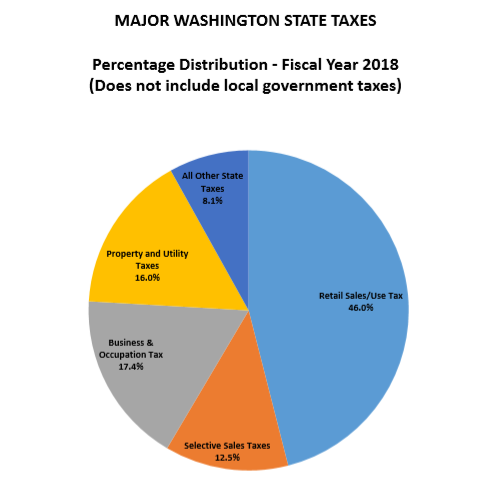
Washington State’s tax revenue will collapse. This is an unavoidable fact. Washington State’s revenues are going to be hit particularly hard. Even the politicians and bureaucrats will be forced to recognize this fact. We could see declines as steep as 25-30%. As you can see from the nearby chart, a majority of Washington’s tax receipts come from either sales tax or B&O tax (gross revenue tax). Both categories of tax collection are in freefall right now due to the steep decline in retail sales (sales tax) and the collapse in business activity in general (B&O). Sure, people are purchasing food in massive volumes, but in Washington State, this won’t help sales tax because food largely isn’t taxed. The tax receipts from large volume purchases of toilet paper won’t make up the difference. Fewer cars sold, reduced sales of property (REET taxes), reduced timber sales (Timber excise tax), and other predictable results of an economy in tough times add up to dramatically reduced tax revenue for Washington State.

As you can see from the nearby chart (from the WA State Department of Revenue), Washington State has experienced declines in tax revenue before. In 2008, there was a decline of 8% in tax collections in the state from 2000 to 2009, and it took a number of years for the tax receipts to exceed the 2007 high-mark. This current economic decline will be even more dramatic. There is no practical way to muddle through the next few years without dramatic cuts in government spending. A lot of frivolous expenditures which were pushed by special interests and successful lobbying must quickly end. This is inevitable. The devil is in the details ,of course, and there are a lot of special interest demons who are gearing up to make sure they don’t get tossed into the budget cutting scrap heap.
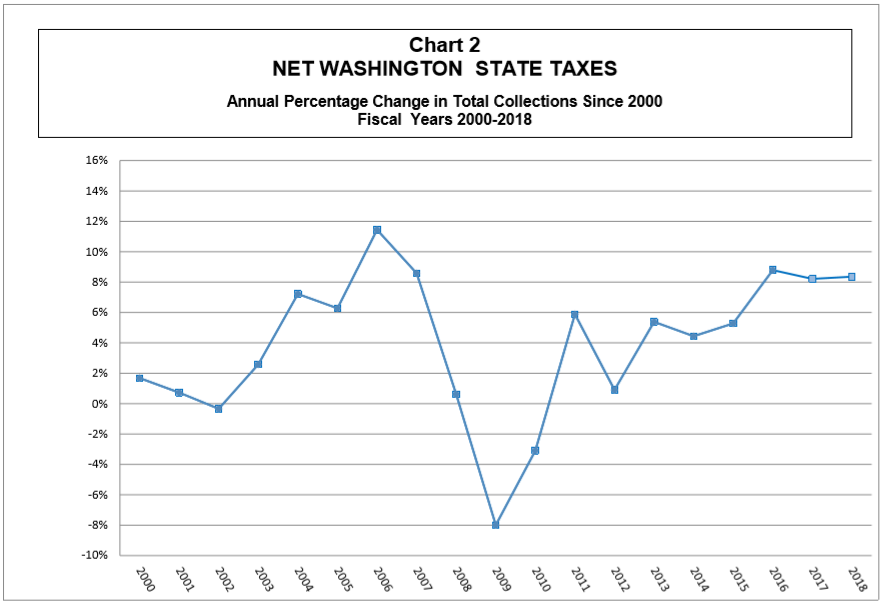
Regardless of the wailing and claims of doom and gloom from the bureaucrats, politicians, and lobbyists, the sooner we make the cuts, the sooner we can get out the other side of this downturn in better shape. Let’s consider a few examples.

Pay Cuts for Senior Bureaucrats and Politicians
All the politicians and senior bureaucrats in Washington State have received pay increases and raises over the past few years. These should be immediately rolled back. In the big scheme of the budget, this won’t be a huge impact, but it will clearly demonstrate a recognition of the seriousness of the problem and at least some level of “sharing the pain.” If the rollback process is too difficult, then a 10% across-the-board cut for all government employees making more than $100,000 per year would be a good start and a 10% pay cut for elected officials would show a degree of seriousness. This should be the first step taken because it will properly set the political tone for more cuts which must quickly follow. It will not impress anyone if these cuts are defined as “temporary” or augmented by some other benefits. Everyone will be suffering, and the politicos don’t get a free pass, regardless of how important they view themselves.

Eliminate and downside “non-essential” agencies
Over the decades, state and local governments have tended to add unnecessary layers of bureaucratic growth, like barnacles on a ship that has been left in Puget Sound too long. It is a hassle and annoying to scrape them off, but now is the time, and there are no more excuses left if we are going to take this seriously. Let’s review a few of the more obvious entities which must be eliminated or seriously downsized:

- Evergreen State College is a failing educational experiment and the nationwide punchline for useless and worthless “higher” education. Lay everyone off, and put this embarrassment out its misery. Stop subsidizing this failure. Use the campus as a Coronavirus Quarantine and recovery facility in the short term, and convert this 1,000 acre campus into a more productive use in the future (homeless camps, drug rehab facility, or other uses have been suggested and all would be more productive than what it is today).
- The Puget Sound Partnership – this was a weird, redundant state agency where the staff are both overpaid and under supervised from the beginning. This scandal plagued entity was originally created as a nepotistic political kick-back scheme for Congressman Norm Dicks (and hired his son to run it for a few years of failure). The primary purpose of its existence has mostly been to focus on justifying its existence. Nobody will notice or care when this thing is gone.
- The Department of Ecology – A downsizing of at least 50% is needed for this agency, and if the economy doesn’t rebound soon, this cut could be just the start. Again, this is often an agency which is focused more on justifying its own existence than in helping the people of Washington State. The misleading and deceptive role this agency played in destroying water rights and denying local citizens their access to water (with the Hirst Decision playing a major role in this excuse) only helps clarify the harm this agency has inflicted on the citizens of the state of Washington. The agencies abuse of it’s “consent” powers to economically destroy local counties and states with threats of litigation and abuse under the Growth Management Act’s shoreline plan “approval” process. Since most of this agency has been politically bloated for decades, the agency director can’t be trusted to downside in an honest or effective manner. Useful departments with real scientists are actually concealed in this agency behind the bloat of Gang Green’s central planning games, and it is possible the legislature must be very detailed about these cuts and where to target them for maximum benefit to the people of Washington State. As this downsize takes effect, some capital facilities consideration should be made for the Lacey headquarters. There will be ample room to accommodate remnants of other state agencies in these soon to empty offices, and reduce the millions of dollars in rent the state currently spends throughout Tumwater and Olympia.
- Washington State Fish & Wildlife – This agency should be cut back to two essential functions, neither of which it does well now, but both of which marginally justify the existence of this agency. These two functions would be the fish hatcheries and the enforce of the hunting/fishing regulations in the state. Nobody can accuse the agency of doing either task well, but budget cuts to the more esoteric projects at WDFW would be necessary and a part of surviving the coming tax collapse while still doing useful things for the people of Washington State. Obvious cuts in upper management and streamlining of the middle management structure of this agency must be part of this downsizing process as well.

The Two Big Agencies that must be cut – DSHS and OSPI
There is no serious budget cutting in Washington State possible without confronting the two agencies that consume the majority of the state budget dollars. This would be OSPI and DSHS. Each one will require a different budget cutting approach to retain “essential services” (always open to individual interpretation), but the following suggested budget cuts are a pretty good initial roadmap for these cuts.

Let’s look at OSPI first. The Office of the Superintendent of Public Instruction consumes vast tax resources, and a surprising amount of it has nothing directly to do with educating the children of Washington State. Each of the 295 school districts have their own independent budgets and elected boards, and while it seems likely that budget cutting will be in effect there as well – those cuts must be addressed at a local level. However, the state bureaucracy itself is where the legislature needs to start. In addition to the obvious across the board pay cut to senior staff including the elected State Superintendent of Public Instruction Chris Reykdal, the staff needs to be cut to a skeleton crew. Remember, these people educate no kids, and cutting here will allow local schools to continue to function. All the “outreach” and “curriculum” recommendation and propaganda business will need to come to an end in this agency as well as cut all staff associated with these activities.
However, the primary budgetary bloat is less to be found in OSPI than it can be found in the nine local ESDs (Educational Service Districts) scattered around the state. There is impressive non-essential bureaucratic bloat to be found here that can and must be cut for the state to avoid radically cutting teachers and traditional in-classroom funds. The ESDs fill a few useful functions for local school districts. These are the only practical functions that should be allowed after this first round of budget cutting. These are centralized HR functions, centralized legal support, and group purchasing for supplies. The rest of the curriculum promotion, special interest projects, SJW programs, employment for senior educational bureaucrats to pad their retirement, and other unnecessary functions must be cut. This would save millions of dollars alone. It is possible some of the ESDs could be consolidated down to two from the existing 9, but that could be a second step if the economy doesn’t turn around quickly.
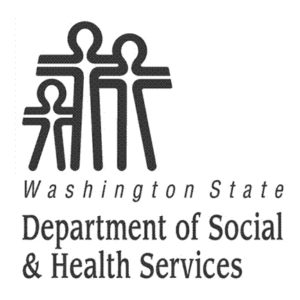
The other tax consumption entity is DSHS, which is the Department of Social Health Services. After the recent spin off of the Dept of Children Youth and Families into its own entity, this just leaves a bloated state agency with a top heavy upper and middle management structure whose primary job is to serve as the distributor of Federal and State welfare payments (in various forms). This primary activity can still continue, but it can be done with far fewer employees. The outreach, education, and development functions should be cut entirely. This would leave the scarce resources focused on the administration of the benefit checks. The oversight/support of county health departments would need to be cut and is often redundant anyway because local health departments do all the heavy lifting in the real public health arena. One aspect to remember when implementing these budget cuts is the tendency of agencies to lay off front line staff while retaining senior upper management positions. This is exactly the opposite of what must be done. In the sub departments that survive, major cuts to senior management and middle management must be made as well as pay cuts for the remaining upper management positions. Right now, this agency, like so many agencies in Washington State, will need to streamline operations, which means fewer managers and certainly far fewer senior managers with a greater percentage of front line staff remaining.
Other policy changes which could positively impact the economy
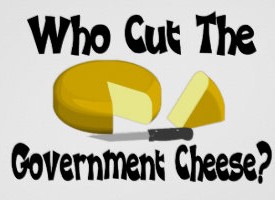
I’ll write about other state policy changes which could be made to improve the economic situation in Washington State without raising taxes or causing more harm to the citizens of the state. Here is one example:
Changing the prevailing wage laws as they apply to Department of Transportation projects. The reduced tax revenue that will be collected from gas taxes will already reduce the number of state transportation projects, but if the state eliminates the prevailing wage laws, then more people can be put to work on critical infrastructure projects using less money per worker hired during great economic times. This would at least keep necessary transportation road projects moving forward and ensure more workers employed without raising taxes and causing harm to the community. This is just one of many policy changes that can be made without negatively impacting the state budget, but which would positively impact state employment and economic recovery.

Serious times require serious decisions by serious people
We are facing a serious economic downturn in Washington State. It appears likely this will be the most significant economic collapse in the local economy since at least the 1930s. This will be true even with the most optimistic outcome for the Wuhan/Corona Virus pandemic currently forecasted. Denying this fact or delaying the serious, logical consequences in state government budget priorities will only make the inevitable cuts far more drastic and harmful than the ones I’ve outlined above. In fact, it is possible even these suggested cuts are not enough to stabilize the state’s finances. However, they would be a serious start. Unfortunately, it will require serious elected officials to make these decisions, and there are few serious people who hold elected office in Washington State today. Elections are scheduled for later this year, and the voters will be given choices (hopefully contrasting choices with at least some serious people running for office). We will need to decide which elected officials are worth keeping and are capable of dealing with this situation. We will need to replace those who are not. We have little time to waste because these are serious times.
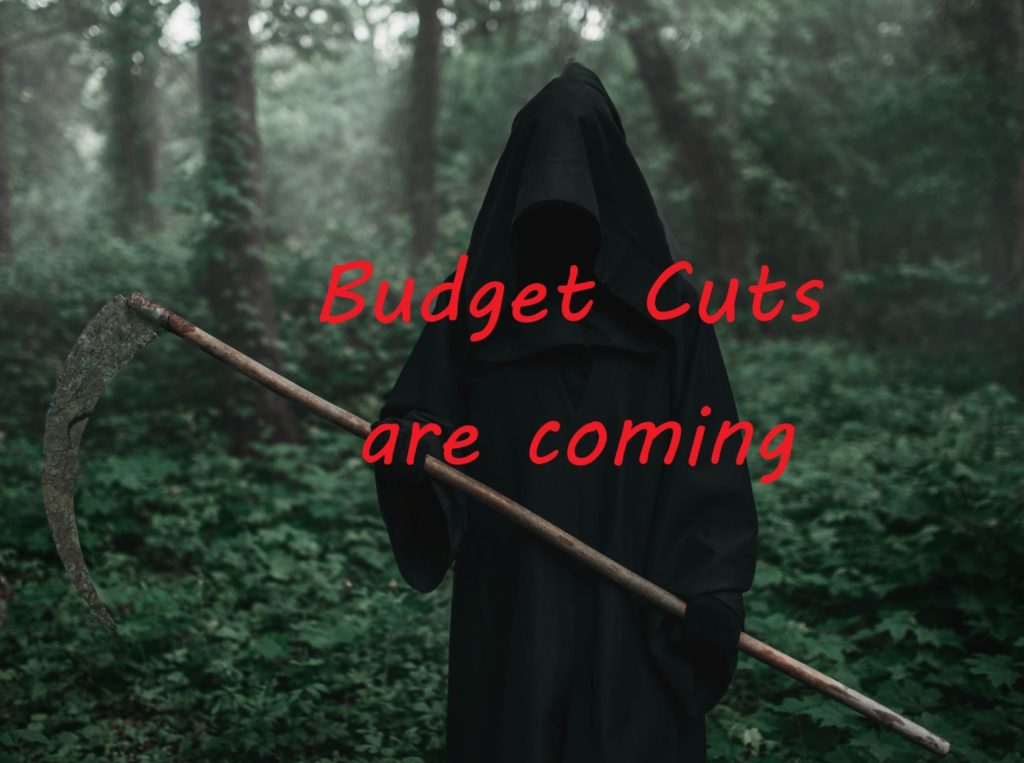
OUR CONSTITUTION BEGINS WITH THE PHRASE “WE THE PEOPLE.” IT WAS THE FOUNDER’S INTENT THAT GOVERNMENT BE CREATED BY THE PEOPLE, TO SERVE THE PEOPLE. IT WASN’T THEIR INTENTION FOR THE PEOPLE TO SERVE THE GOVERNMENT. IT WAS ALWAYS INTENDED THAT GOVERNMENT WHICH FAILED TO SERVE THE PEOPLE SHOULD BE “ALTERED OR ABOLISHED.” UNTIL WE RETURN TO THE FOUNDER’S INTENT, WE REMAIN WE THE GOVERNED…
Background articles and documents:
Evergreen State College – The next Corona Virus Quarantine Facility?
Evergreen College Should be shut down
Let’s Turn Evergreen College into Addict/Homeless Camp – A Real Solution to Homelessness
Should Evergreen College Just be Shut Down?
Gang Green and the Government Staff Infection
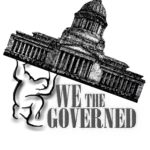






The ‘worker bees’ are always the first to be cut by state government. They are the ones who interact with the public and when the public complains then the budget is increased. I am convinced the Dumbocrats will do their utmost in order to raise taxes instead of cutting budgets. I see a push to tax the ‘big corporations’ since they allegedly don’t pay their ‘fair share’. I think cutting state government is going to be a tough sell in this state; especially since Socialism so popular on the West side of Washington. ‘I can see all of the votes I need from the top of the Space Needle’ – former U.S. Senator Henry ‘Scoop’ Jackson.
Government will always cut the ‘worker bees’ instead of management. Those folks interact with the public and when they are gone the public complains and thus the budget is increased. I also am convinced that instead of reducing the budget the mantra by the Dumbocrats in this state will be ‘tax the big corporations’. Because they don’t allegedly pay their ‘fair share’. It is going to be a tough sell to cut state government. The trend towards socialism is very strong in this state, especially in Western Washington. ‘I can see all the votes I need from the top of the Space Needle’ – former U.S. Senator Henry ‘Scoop’ Jackson.
Great job Glen.
Thank you for your kind words. Feel free to share this with others…
This is a good start. Now add:
Any department with sustainability in its name or mission.
Review regulations – get rid of at least 50%
Review occupational rules and get rid of all that are intended to limit competition or support prices. Taxis being a good example.
All departments, agencies that are trying to get people out of cars – ZERO THEM OUT.
Any mass transit scheme that costs more than cars.
Roll back ALL actions that have made housing less affordable. (Hint: GMA!!)
All departments/ agencies that are involved with climate AKA: Al Gore’s climate scam.
Excellent addition to the cut list…
Comments are closed.